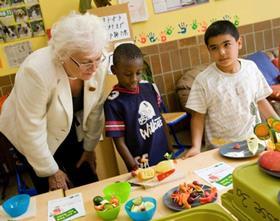
Freshfel Europe has called into question the European Union’s new Healthy Eating Campaign for school children, which is being run alongside the School Fruit Scheme and School Milk Scheme, describing it as “simplistic” and “ill-coordinated”. The association said in a statement that it found the message of the campaign inaccurate, and said that it felt resources were not necessarily being spent correctly.
According to Freshfel, the campaign to promote the consumption of fruit and vegetables and the one for milk should have been kept separate and not united under one banner, given the differences of the two schemes. Additionally, Freshfel sad that focusing on just two categories gave the wrong impression of what constitutes a balanced diet.
“Information on a balanced diet is more complex than just milk and fruit and vegetables,” said Raquel Izquierdo de Santiago, Freshfel’s food policy advisor. “Addressing schools talking only about these two categories together is not appropriate nor comprehensive from a nutrition perspective.”
Additionally, Freshfel has expressed concerns over the launch of the campaign at a time when there is still “much work” to be done on ensuring that the School Fruit Scheme functions correctly. “We are really disappointed that a dedicated pan-European website for fruit and vegetables is not yet in place to accompany the scheme,” said Freshfel general delegate Philippe Binard. “We are still hoping that a networking meeting among officials, member states and stakeholders, set up by the Commission by the end of the year for a first review of the situation, exchange of best practice and possibly to motivate those who have not yet embarked on a programme to prepare projects for the next school term 2010-11.”
In the meantime, Freshfel has continued to stress the importance of a healthy diet and lifestyle in conjunction with World Heart Day, which took place on 27 September. “Fruits and vegetables are good sources of vitamins and minerals; they are low in calories and rich in dietary fibre,” said Ramon Rey, president of Freshfel. “A diet high in fresh produce is scientifically proven to prevent cardiovascular disease and reduce your risk of heart disease. Besides, eating more fruit and vegetables may help you eat less of those foods that should be limited, such as high-fat, high-salt foods.”
Separately, UK-based trade association Fresh Produce Consortium (FPC) has argued that a short-term European Union healthy eating campaign for children will fail to deliver long-lasting benefits. In a statement, the FPC said that EU schemes will not enjoy sustained success as they do not tie in with existing UK schemes to maintain healthy eating habits among children.
“We recognise that the EU’s healthy eating campaign and ‘Tasty Bunch’ roadshow will introduce some people to the idea of enjoying fresh fruit and vegetables over a short period,” said Nigel Jenney, chief executive of the FPC. “However, the EU appears to be funding and launching a highly disjointed campaign across EU member states, with an apparent lack of engagement with the government and the fresh produce industry here in the UK. Consequently this campaign in likely to miss the mark in fighting childhood obesity.”
Mr Jenney noted that it was vital healthy eating initiatives were sustained and supported through local and national schemes to ensure that healthy eating habits among young children are properly established.
“It’s frustrating to see a lack of integrated strategy from the EU through to national governments which would have delivered better value and ensured a lasting impact on our children’s diets, rather than a ‘flash in the pan’ campaign,” Mr Jenney said. “We believe that in the UK this EU funding should have gone to support already successful initiatives such as the Schools Fruit and Veg Scheme, the Change4Life campaign, and current trials of Food Dudes.”
He added: “We’ll be seeking assurances from the EU that it will coordinate more effectively in the future.”



